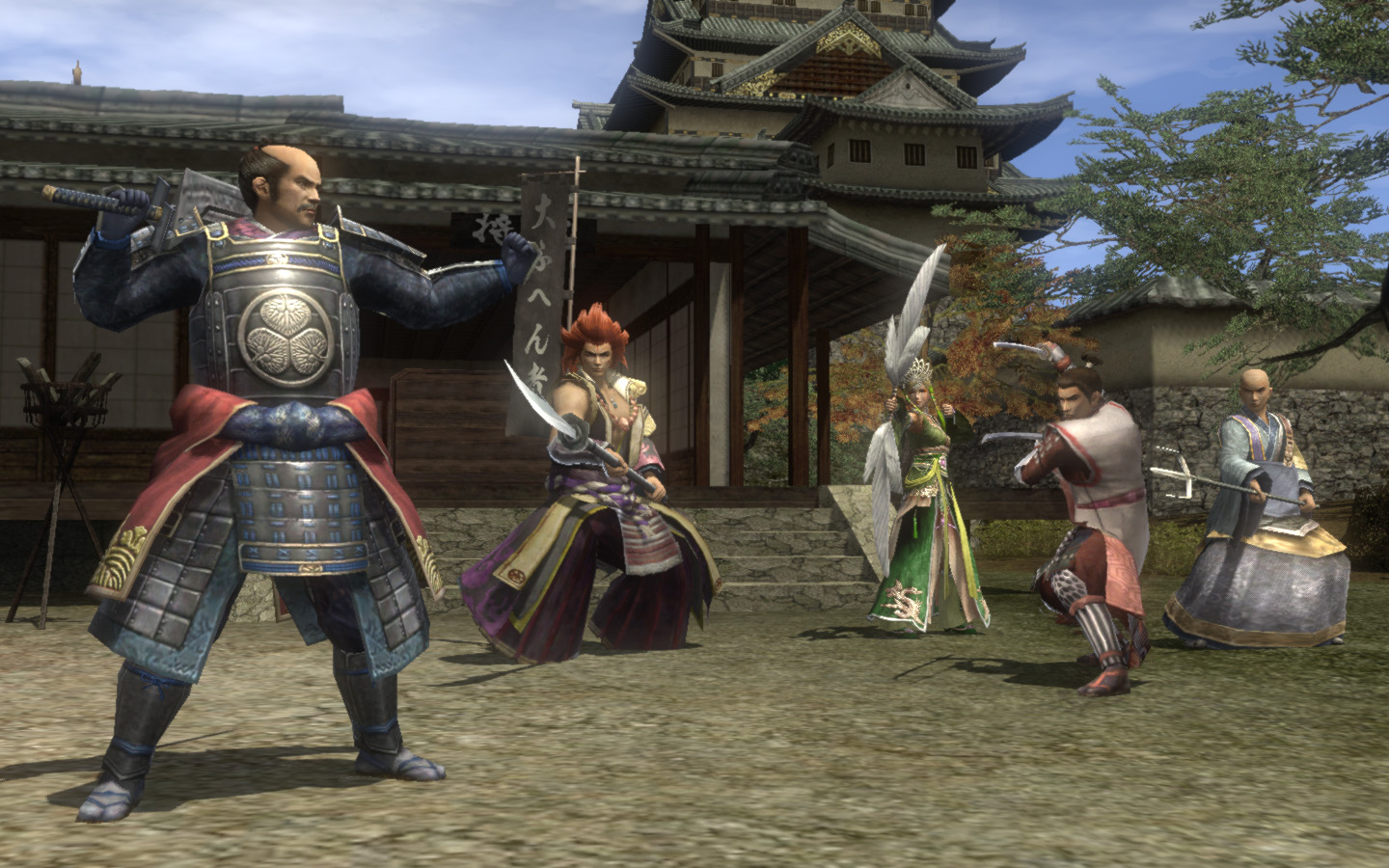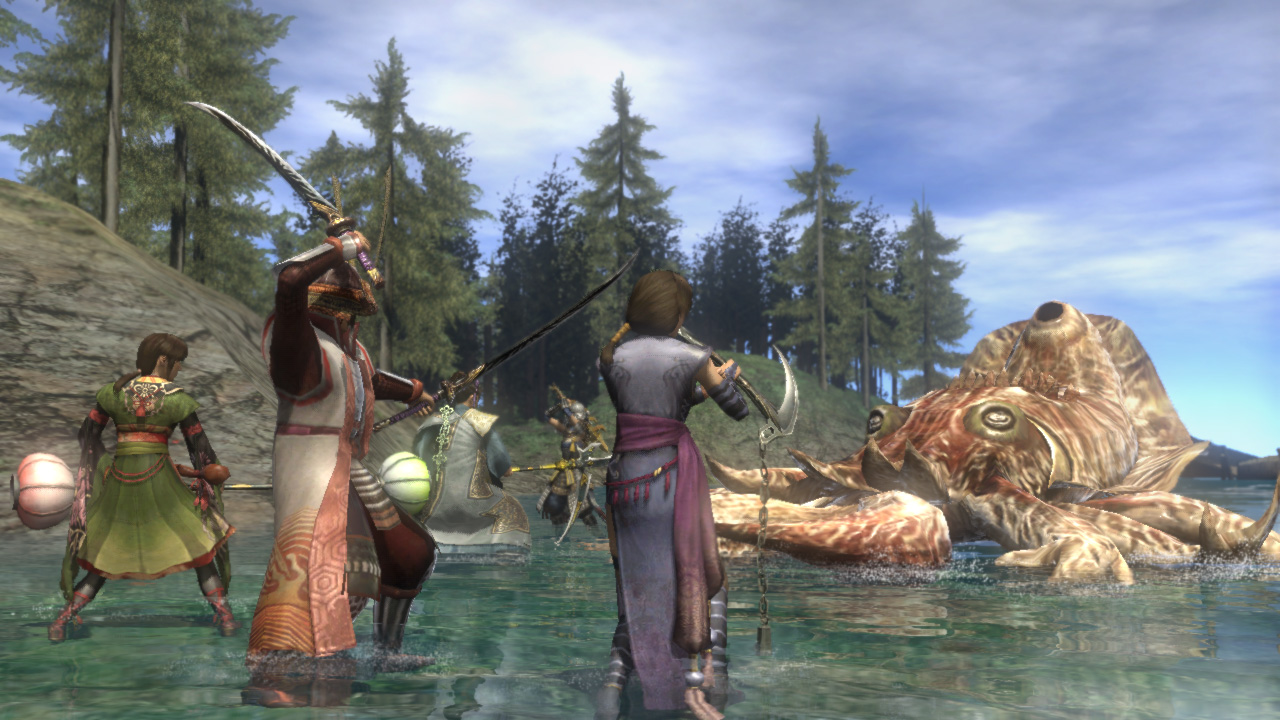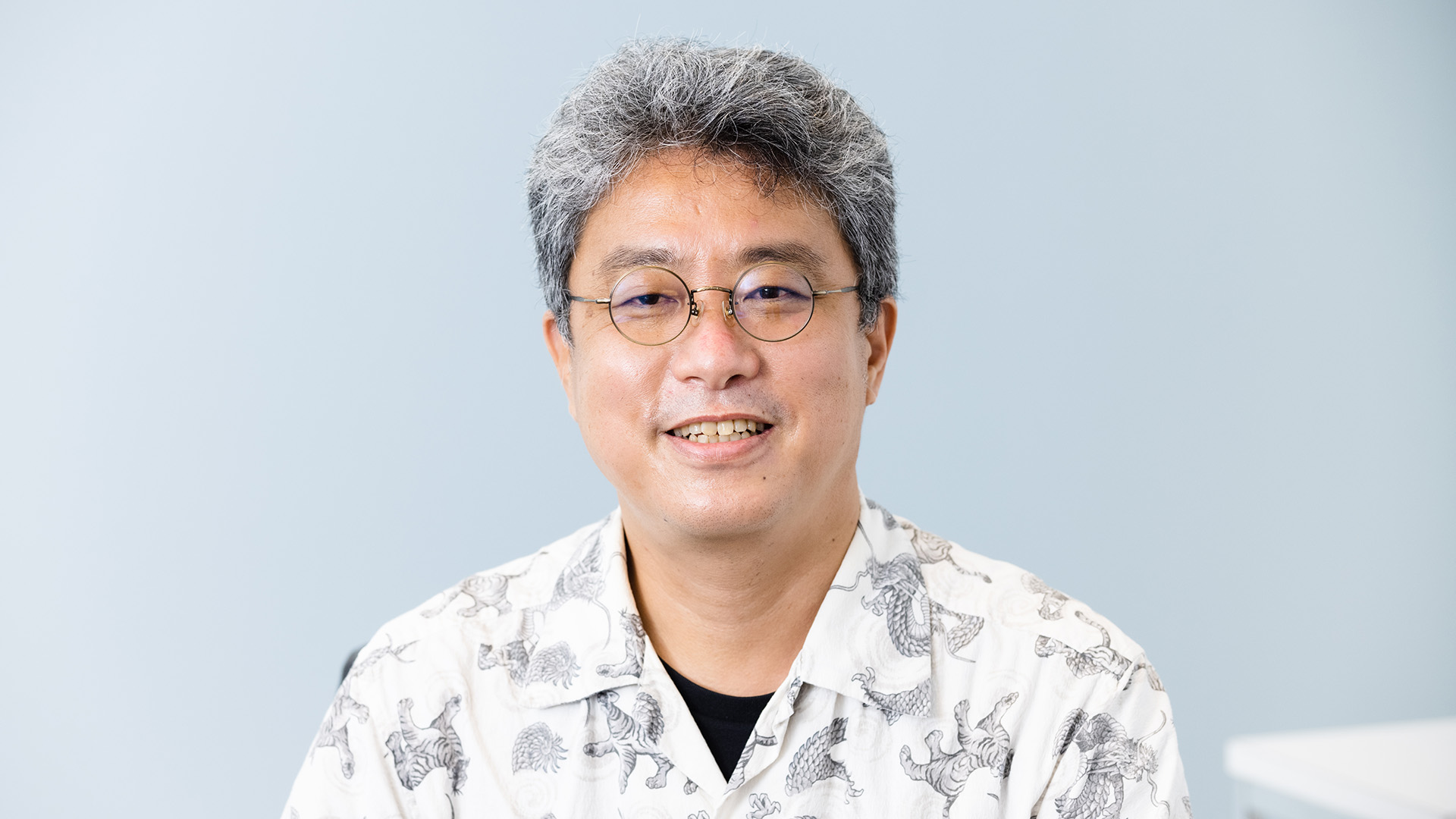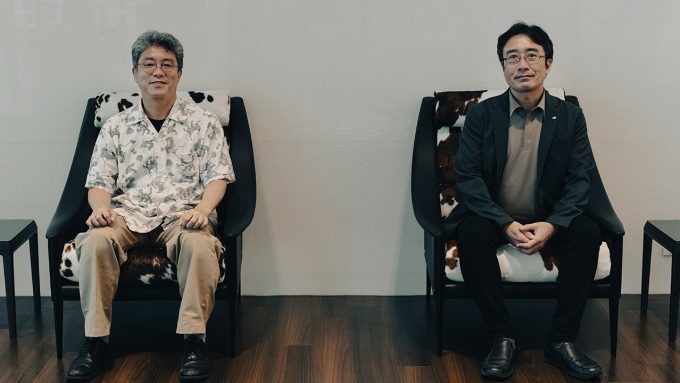For our third guest, we invited Yutaka Kawamata, the producer of NOBUNAGA’S AMBITION Online (NAO). In this second part, he spoke about the game’s launch and in-game events.

Developer of NOBUNAGA’S AMBITION Online, an MMORPG based on the world of the NOBUNAGA’S AMBITION* series. In addition to his role as Director, he has assumed the position of Producer as of June 2019.
* NOBUNAGA’S AMBITION is a series of historical simulation games set in the Sengoku period of Japan, the first of which was released in March 1983. The series has continued to evolve since then, and the upcoming 16th title in the series, NOBUNAGA’S AMBITION: Shinsei, is scheduled to release this winter.
 NOBUNAGA’S AMBITION Online is an ongoing popular online RPG based around the premise of living in the world of the Sengoku period. Players may serve under prestigious clans such as Oda, Uesugi, Takeda, and Date, and fight their way through large-scale battles of up to a thousand players in the name of uniting the country under one rule.
NOBUNAGA’S AMBITION Online is an ongoing popular online RPG based around the premise of living in the world of the Sengoku period. Players may serve under prestigious clans such as Oda, Uesugi, Takeda, and Date, and fight their way through large-scale battles of up to a thousand players in the name of uniting the country under one rule.
NAO players and their unique role-playing
Mr. Matsui, what were your thoughts when NAO was announced and released after FFXI had already launched?
- Matsui
My first thoughts were, “We’re not the only ones leaping into the difficult world of MMORPGs!”
Additionally, because FFXI had started first, I had a bit of a lofty attitude towards them and thought, “You won’t last long unless you’re truly committed!” I played it off as if to say, “Our target audiences are different, so we’re not worried,” while in reality, I was sort of glancing at them out of the corner of my eye. (laughs) Since both games were operating on the PS2, I wanted to mimic any aspects where they received positive reviews or avoid any mistakes that NAO might make before us, so I’d say I was watching them from afar.
By the way, regarding your target audience, would you say that the majority of NAO players are fans of NOBUNAGA’S AMBITION and other Koei titles? - Kawamata
Actually, I’d say a lot of them are enthusiasts of the Sengoku period of Japanese history.
There was this time I’d tagged along for a NAO exhibition at Tokyo Game Show, where I was approached by attendees asking, “Is this an online version of NOBUNAGA’S AMBITION?” When I replied along the lines of, “No. In this game, you don’t play as Nobunaga, but the soldiers instead,” some attendees seemed quite intrigued by my answer.
So while there’s a lot of NAO players who are fans of the series, I also believe a lot of the players are simply MMORPG fans who also like Japanese culture and the Sengoku period. - Matsui
After all, if the game allowed you to play as notable historical figures, it wouldn’t be an online RPG but an online simulation game instead.
That’s a good point. It wouldn’t make sense as an MMORPG if everyone could play as Nobunaga himself. In that sense, I understand that the setting has an emphasis on Japanese culture and the Sengoku period, rather than the historical figure of Nobunaga.
- Kawamata
On a related note, I think Japanese culture has a sense of “regional loyalty,” or a deep-seated fondness for one’s homeland. I’m from Odawara, so I like the Hojo clan and Odawara Castle, which carries over into games where I’ve done numerous playthroughs to unite all of Japan as the Hojo clan. Those are the kinds of people that have gathered in NAO, so there’s a strong solidarity and a sense of regional pride between players with the same family crest. For instance, fans of the Takeda clan don’t get along with fans of the Uesugi clan, and both groups seem to have this rivalry of, “Anything but losing to those guys!”
That sounds very befitting of a game with many Sengoku period enthusiasts like NAO.
- Kawamata
In NAO, there are these large-scale battles between nations. Before players went into battle, however, apparently there was this player custom where the top players would have a discussion, then send a messenger to the opposing nation. Once a meeting time was established, the messenger would enter enemy territory all by themselves to meet with the enemy’s top players to try and negotiate a treaty. When I heard about this custom, I felt the world of NAO had grown beyond our original design, and I remember thinking, “Man, MMORPGs are amazing, what a wonderful world!”
- Matsui
That’s some wonderful role-playing.
FFXI also has players who are very proud of their starting nation, and some even have their own exclusive link shells, but hearing your story made me think those players were even more tight-knit than that. Giving a lone player the task of representing their nation in a meeting sounds like something that could only work in a setting like NAO’s. However, the setting of NAO seems quite different from that of other NOBUNAGA’S AMBITION titles. Did you face any struggles when designing a different setting?
- Kawamata
Up until then, NOBUNAGA’S AMBITION was about playing as the leader of a nation to handle internal affairs or go to war with other nations. When making an MMORPG adaptation, although the game was still set in the Sengoku period, players went from being powerful leaders commanding thousands of subordinates to just regular individuals.
On top of that, the game is an RPG, which naturally meant we needed enemy encounters. Although the game is set in the Sengoku period, we thought it’d be boring if there were only human enemies such as soldiers and bandits. So we added other enemies in the form of animals and creatures from Japanese folklore, to which players responded, “That doesn’t match the setting!” and for a while, the game was considered a “Japanese folklore game.” I remember taking another hard look at what it meant to make an MMORPG of NOBUNAGA’S AMBITION. - Matsui
In that sense, FINAL FANTASY has a lot of freedom in what players will be fighting against. Of course, that comes with its own struggles...
On the topic of enemy encounters, a defining feature of NAO’s battles is how players can maintain in-depth communication even during combat. The battle system is based on field encounters*, but please tell us about how you came to that decision.
* Field encounters are a type of battle system where players can interact with enemies displayed in the overworld to transition into a separate battle instance or menu.- Kawamata
Some of it was DRAGON QUEST’s influence, but we felt that command-based battles were really easy to understand. We considered how that might work in an MMORPG and structured the battle system around it, then adapted the roles of tank/damage dealer/healer into a Japanese setting. As we expanded onward from there, we eventually ended up with the current battle system.
Battles in NAO are somewhat similar to chess problems in how you consider the strategies of both sides. We were testing the barebones battle system without characters or anything, when we eventually found something that seemed like it could work and decided to go with it. NAO is the only MMORPGs where you can go use the restroom during a battle. (laughs)

While perhaps not as lenient as NAO, it’s also easy to communicate during a battle in FFXI.
- Matsui
As a matter of fact, the auto-attack system was created so players could communicate when they weren’t busy. After all, communicating with other players is one of the main ways to enjoy an MMORPG.
On the topic of battle systems, during FFXI’s development, we had a lot of people who said, “We should use field encounters and use all of the VRAM to show the player’s party, so we can go all out and make battles really flashy.” In the actual game, combat takes place directly on the overworld, so you have to depict other characters outside of the player’s party too.
- Matsui
On the opposite end, we had people who said, “Would it really be an MMORPG if you couldn’t save other players when they need help?” There were several debates between the two sides until we finally ended up with the current system.
Continuing on the topic of battle, did you have any trouble deciding what kind of jobs should be added into NAO?
- Kawamata
We had all sorts of ideas, but samurai and ninja were obviously a given, even if they overlapped with Rise of the Zilart. (laughs)
(everyone laughs)
- Kawamata
After that, we decided Buddhist monks and physicians would be the healers, and onmyoji would be the spellcasters. Then we had the suggestion, “What about Shinto priests?” which turned into “Well, we should have shrine maidens instead of Shinto priests,” so we ended up having the job name change between Shinto priest and shrine maiden depending on character gender.
But then players asked, “Why are Shinto priests and shrine maidens are divided by gender, when there’s no kunoichi for ninja?” (laughs) While it’s important for us to stay true to Japanese culture, it was quite difficult for us to address everyone’s particular interests. - Matsui
Perhaps the current NAO is built on that sort of input from staff members and players.

Seasonal events in FFXI and NAO
- Kawamata
Also, for a while after launch, there was quite a lot of opposition towards anything that wasn’t related to Japanese culture.
For example, when we tried to implement Western attire and Chinese dresses, we were immediately confronted by players who insisted, “We don’t need that in the world of NAO!” It was the same with events, and players insisted against Western festivities like Christmas and Valentine’s Day.
However, the operations team still wanted to have events with a sense of season, so we held an event that was explained as a “Japanese attempt at replicating a foreign event known as ‘Christmas’.” We had Daikokuten in place of Santa Claus, and deer in place of reindeer, and tried to express the feeling of Christmas using Japanese culture. As we continued to devise events in this way, players eventually got used to it, and we were able to add more variety over time. - Matsui
Almost like how Japan opened up to the West after the national seclusion period. (laughs)
However, since the game is very role-play oriented, I’m sure some players would be unhappy if Santa Claus suddenly appeared in that setting. With that said, I can definitely sympathize with wanting to do seasonal events, since they provide important allusions to the real world. I can see why you went as far as re-interpreting everything with a Japanese theme to incorporate those allusions into the game. - Kawamata
Now that I think about it, we hardly had any events when we first launched the game. We didn’t have the knowledge in the first place, and we only had a shallow understanding of what it meant to “operate an MMORPG.” Looking back, I imagine we saw these one-time events as a waste of development resources, when we could make permanent content to be enjoyed over and over again. But when we finally tried holding an event, it ended up being really well-received.
I personally see MMORPGs as one aspect of everyday life, but from that experience I learned that even our everyday lives need special occasions to change things up. We eventually shifted to doing periodic events on a monthly or weekly basis. What was it like when events were implemented in FFXI?
- Matsui
Many of FFXI’s in-game events began as proposals from the operations team. This was because the development team had their hands full with completing mountains of tasks in time for Rise of the Zilart’s release. When the operations team approached us about making events, we responded along the lines of, “We can’t spare time to plan them, so we’ll implement them if you can come up with a proposal,” and that was how the operations team began handling event proposals.
- Kawamata
In what ways were you personally involved with events, Mr. Matsui?
- Matsui
I think the first event I worked on was the one with the rabbit, in 2002? I was asked to create some rewards, so I made a number of clubs, including the Rabbit Stick. I may have made more and just forgotten about them. (laughs)
Back then, it was all we could do to just focus solely on tasks with a clear deadline or high priority. We were so busy that I had no time to play other games for several years following launch. Was it like that for NAO as well?
- Kawamata
As I was preparing for today’s conversation, I spoke with one of our longtime staff members about our struggles during launch, back when he and I were nothing more than members of the development team.
Following a large-scale update, we were asked to temporarily switch to a three-shift cycle to monitor the game 24 hours a day. My colleague ended up with the graveyard shift, but at the end of his shift on the last day of the temporary schedule, he was told, “You’re staying in the office and going straight into today’s shift.” On top of that, when he finally finished his shift and was about to take the last train home, the servers crashed and he was called back to the office... - Matsui
No matter where we go, we always hear these terrible stories. (laughs)
- Kawamata
Back in the day, if it was crunch time for an update, we handled development tasks during the day and played the game at night, and it was commonplace for us not to sleep. Even if we finished our tasks, there’s always things that are missed until you play the game, so we were expected to allocate enough time to play. In those early days, us sacrificing our daily lives and everything else was just barely enough to keep development rolling.
- Matsui
That reminds me of how when we held a beta test for FFXI, everyone else in the company outside our project discovered what kind of game FFXI was.
When it comes to typical game development, there’s hardly any time for other teams to say this and that about your game while it’s in production. But since the beta test was like an interim report, and the game was still in a stage where it could be changed, people with their own visions for FFXI came to me, the Battle Designer, with all of their opinions. They came in to share their lengthy opinions about the battle system, but I still had a lot of other things to take care of.
I felt like I would never get anything done if things stayed that way, so one day, I decided to flip my schedule to work at night. I’d come into the office after everyone else had gone home, work through the night, then go home at 9 AM. Nowadays, there’s stricter guidelines and working conditions like that probably wouldn’t be allowed, but it seems that reckless style worked for some people back then.
- Matsui
Before release, I treated it like I would any other game and didn’t see any issues with that kind of working style. But once the game launched, I realized, “Oh no, things are going to stay this way!”
That’s the rough part about games as a service.
- Matsui
Later on, we began talking about dividing the team into two around Chains of Promathia, and I was assigned subordinates, which made things much easier for me. Up until then, there were only two of us in the Battle team including myself, and we were always working on the next version update. Whenever the level cap was increased, we had to adjust monster spawns and add new items, and we were exhausted out of our minds.
- Kawamata
Those kinds of struggles seem to be no different anywhere else. I remember whenever I heard there was an issue in FFXI, I would compare it with my personal experiences and imagine, “I bet some of those guys didn’t get to sleep...”




